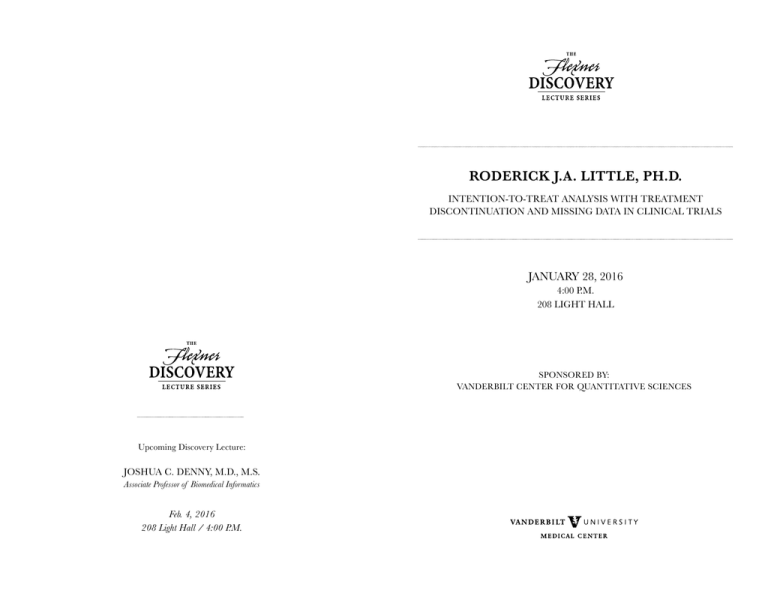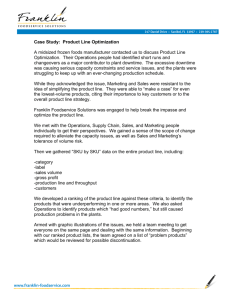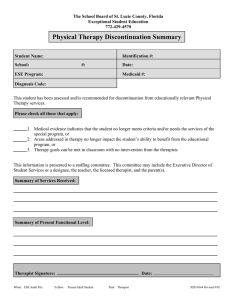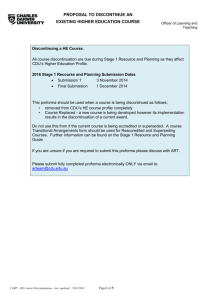RODERICK J.A. LITTLE, PH.D. JANUARY 28, 2016
advertisement

RODERICK J.A. LITTLE, PH.D. INTENTION-TO-TREAT ANALYSIS WITH TREATMENT DISCONTINUATION AND MISSING DATA IN CLINICAL TRIALS JANUARY 28, 2016 4:00 P.M. 208 LIGHT HALL SPONSORED BY: VANDERBILT CENTER FOR QUANTITATIVE SCIENCES Upcoming Discovery Lecture: JOSHUA C. DENNY, M.D., M.S. Associate Professor of Biomedical Informatics Feb. 4, 2016 208 Light Hall / 4:00 P.M. RODERICK J.A. LITTLE, PH.D. INTENTION-TO-TREAT ANALYSIS WITH TREATMENT DISCONTINUATION AND MISSING DATA IN CLINICAL TRIALS I discuss two aspects of the analysis of clinical trials when participants prematurely discontinue treatments. First, I formulate treatment discontinuation and “analysis dropout” as different missing data problems: analysis dropout concerns missing data on outcomes, and treatment discontinuation concerns missing data for a covariate defining principal strata for completion under alternative treatments. Second, the standard choice of intention to treat (ITT) estimand, the average effect of randomization to treatment, has the disadvantage that it includes the effects of any treatments taken after the assigned treatment is discontinued. I discuss alternative estimands for the ITT population, and argue that one in particular, a summary measure of the effect of treatment prior to discontinuation, should receive more consideration. The choice of estimand is an important factor in considering when follow-up measures after discontinuation are needed to obtain valid measures of treatment effects. Ideas are motivated and illustrated by a reanalysis of a past study of inhaled insulin treatments for diabetes, sponsored by Eli Lilly. (Joint work with Shan Kang) RICHARD D. REMINGTON DISTINGUISHED UNIVERSITY PROFESSOR, BIOSTATISTICS DEPARTMENT MEMBER, INSTITUTE OF MEDICINE Rod Little is Richard D. Remington Distinguished University Professor of Biostatistics at the University of Michigan, where he also holds appointments in the Department of Statistics and the Institute for Social Research. From 2010-21012 he was the inaugural Associate Director for Research and Methodology and Chief Scientist at the U.S. Census Bureau. He has over 250 publications, notably on methods for the analysis of data with missing values and model-based sample survey inference, and the application of statistics to diverse scientific areas, including medicine, demography, economics, psychiatry, aging and the environment. Little’s Wiley text Statistical Analysis with Missing Data, co-authored with Donald B. Rubin, is a highly cited book on the subject. Since his work as a statistician for the World Fertility Survey, Little has been interested in the development of model-based methods for survey analysis that are robust to misspecification, reasonably efficient, and capable of implementation in applied settings. Little’s inferential philosophy is model-based and Bayesian, although frequentist properties matter and the effects of model misspecification need careful attention. Little is an elected member of the International Statistical Institute, a Fellow of the American Statistical Association and the American Academy of Arts and Sciences, and a member of the National Academy of Medicine. In 2005, Little was awarded the American Statistical Association’s Wilks Medal for research contributions, and he gave the President’s Invited Address at the Joint Statistical Meetings. He was the COPSS Fisher Lecturer at the 2012 Joint Statistics Meetings.



